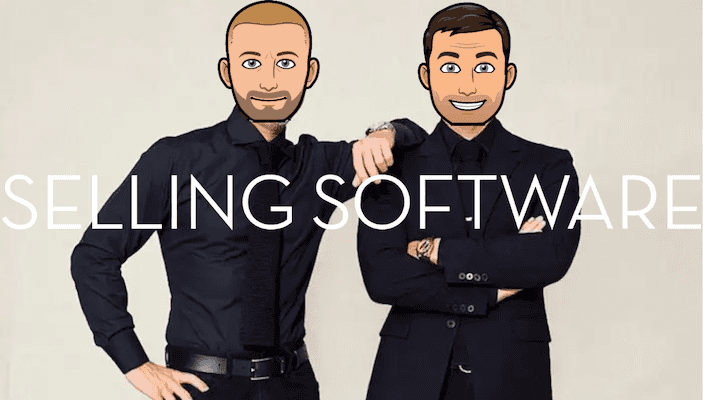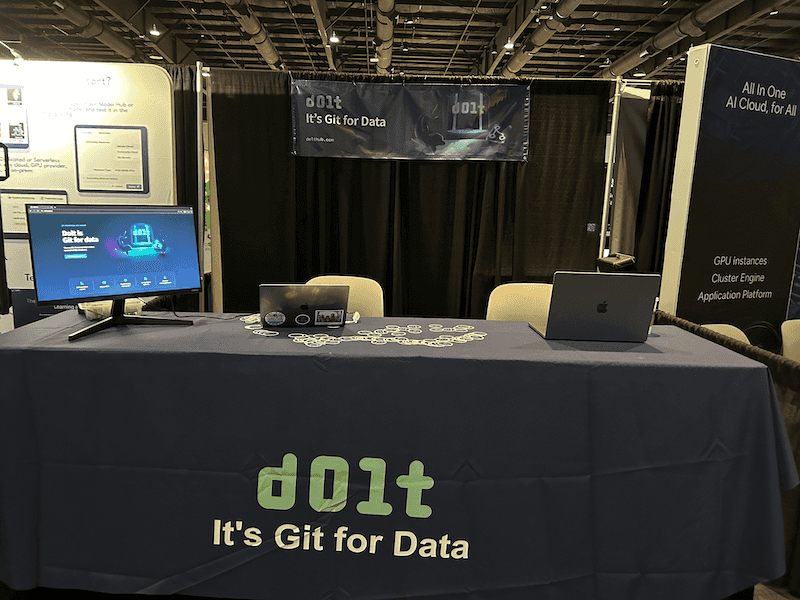Selling Software: Conferences
Conferences are sales events we reluctantly spend money on even though our attendance has not generated a single sale. Why do we keep going? I've written about this before but this article will go into more detail with the information we've gleaned over the last 9 months or so since the last article.
Conveniently, as I publish this blog, we have a booth at the Generative AI Summit in Santa Clara. Stop by and say hi if you are attending as well.
As always, we're Selling Software!
What is Selling Software About?
If you're new to DoltHub, let's set the table a bit about what we do and what we sell.
Our primary product is Dolt, the world's first and only version controlled SQL database, which is proudly free and open source. Our product competes with other open source online transaction processing (OLTP) databases, MySQL and Postgres. Dolt has version control features other databases do not have. Open source databases generally monetize via support, hosting, or enterprise editions though the company or foundation building the database is not always the best at monetizing it.
Dolt supports Git-like version control of databases. Git is monetized by remote hosting and collaboration platforms like GitHub and GitLab. Dolt has similar products called DoltHub and DoltLab respectively.
So, following those sales strategies from our two technological influences, at DoltHub we sell:
Most of our revenue is split evenly between support, Hosted Dolt, and DoltLab Enterprise. DoltHub Pro is not a big money maker for us yet.
Our primary marketing is done through our blog which you are reading right now. We publish five articles per week. We notify potential readers of new articles on LinkedIn, X, and Reddit. Some of our blog content is catered towards search which tends to be the best channel for generating new interest.
Additionally, we do a booth at a conference about once per quarter. We're discussing this in great detail in this article.
We do customer engagement through our Discord, email, and GitHub Issues. I send a weekly update email to everyone who has signed up for DoltHub.
Once we identify a potential customer as a lead, Brian takes over and works the lead until it's closed, positively or negatively.
This is a pretty simple sales motion but it took a while to land here. This blog series will explain how we got here.
Conferences
Conferences are a big business in tech. There is a conference for everyone. People in tech like to take a few days away from their day jobs to geek out about some topic. Languages have conferences. Golang has Gophercon. Java has JavaOne. Every major cloud product has a conference. AWS has Re:Invent. Google Cloud has Next. Products have conferences. Product verticals have conferences. You get a conference! You get a conference!
Conferences generally have a speaker agenda and a big trade show like hall where companies have booths. There are also usually networking events in the evenings where people gather, have drinks, and discuss the event and other topics.
There are three ways to attend a conference:
- Attend
- Speak
- Sponsor
Here at DoltHub, we've tried every one with the purpose of generating interest, and hopefully sales, in our products. We've had varying degrees of success with each strategy. Let's tackle each in turn.
Attend
Early in the company history when we were pursuing the data sharing use case aggressively, I attended some conferences. It's been so long I don't remember some of their names. These are some I remember:
- BattleFin, an alternative data conference
- Another alternative data conference in NYC
- Domino Data Conference in San Francisco
- Git conference in LA
In my experience, being an attendee at a conference is pretty close to useless from a sales perspective. To sell, you have to approach speakers or people at the scheduled networking events and cold pitch them your product. They may not be your target audience, in our case, engineers. The people manning booths are generally in sales or marketing, again, not engineers.
Attend a conference if you want to learn or be sold to. Do not attend a conference on a normal ticket and expect to sell.
Speak
Getting speaking engagements at conferences has proven difficult for me. I have applied to speak but never been accepted. However, Zach has spoken at Gophercon and some other data science one in NYC.
In our experience, being a speaker is better than being an attendee, but still not great from a sales perspective. You have a captive audience of the people in attendance at your presentation. However, most times you are speaking about a technical subject related to the product you are building. It's not a sales pitch. We've had no success generating sales leads by sending speakers to conferences.
Sponsor
Sponsoring a conference to get a booth is the strategy we've settled on as most effective, though we're still not sure it has positive return on investment. We've sponsored the following conferences:
We chose these conferences because they represent two initial target markets where Dolt is seeing success: video games and machine learning.
Having a booth at a conference seems best for Dolt. People walking around the conference hall have the intent to learn about products. You have all manner of folks, but importantly for us, there are also technical management and engineers pacing the floor. I'll dig into our booth strategy in the rest of this article.
Cost
Sending people to conferences is expensive, both in time and raw dollars. Conferences usually are 2 to 4 days of time not spent doing your regular job. An attendee ticket usually costs between $1,000 and $5,000. Being a speaker usually comes with a free attendee pass. Travel usually costs between $2,000 and $4,000. We generally look for sponsorships less than $10,000 but sponsorships can scale up to greater than $100,000. I've heard a basic booth at AWS RE:Invent costs $75,000.
These are the cost ranges you're looking at for each type of conference attendance:
- Attend: $3,000 to $10,000 per attendee
- Speak: $2,000 to $4,000 per speaker
- Sponsor: $14,000 to $20,000 for two people to man a booth if you keep sponsorship around $10,000
Depending on the lifetime value of a customer for your business, you could easily have to convert one or more customers to justify the cost of attending, speaking at, or sponsoring a single conference.
Our Set Up
When we sponsor a conference, we get a booth. This was our booth up last year at Ai4.
And this is our most recent set up at GDC:
We added the high fidelity roll up banner in lieu of the low fidelity banner we hung on the back of the booth. We have a Dolt table cloth with "Git for Data" prominently featured. We own the monitor and Brian brings it as checked luggage in a case. Some conferences were charging an additional $1,000 for a monitor. We play the Dolt promotional video with captions on from an iPad. Our entire setup cost less than $1,000 and can be reused. It takes less than an hour for one person to set up and take down.
People were always asking for something to take with them. We started with a 8x11 brochure on heavy stock but that was cumbersome. We switched to stickers but those were more swag than memento. So, we settled on standard business cards with our logo, website URL, and a QR code. People seem to like these.
Brian and I man the booth.
Our Script
Once we're at the conference and the hall is open to attendee traffic, we wait for people passing by to show a modicum of interest. A person will linger a little longer than usual and we say hello or the person asks us an opening question.
Passer By (Curious about Tag Line): What is Git for Data?
Dolt: Dolt is a MySQL-compatible database with all the Git features you know and love: push, pull, branch, merge. Imagine Git and MySQL had a baby.
Passer By: <Intrigued. Questions follow.>
Dolt: Would you like to see a demo?
For our demo, we use the Dolt Workbench. We used to use the Dolt command line interface but that did not show well even for technical customers. It was hard to portray all the Git features we've implemented. The Dolt Workbench is more feature and information dense so our audience can get a much better idea of the scope and scale of what we built.
The demo consists of us editing and updating a toy database we build for the conference. For GDC, we built a database of everyone who came by the booth's favorite video game. We insert a row, make a Dolt commit, and show the new commit in the logs. Then, we push the changes to DoltHub to show off the online, asynchronous collaborative aspects of Dolt.
I used to do the demo but now Brian has seen it enough he can do it as well. We often have multiple people at the booth at once so two people is definitely better than one.
Finally, we finish by scanning people's badges. This is so we can follow up with them after the conference.
This process seems to work. We have people coming back asking follow up questions. We have had a few people say something like "This is the coolest company here." or "This seems so obvious. I can't believe no one else does it." Vibes of the attendees who hit our booth are good.
Follow Up
We use those scanned badges to reach out to the folks who hit our booth in person or virtually. We get about a 25% response rate on these follow ups. We've generated a handful of meetings from the follow ups but no sales as of yet. Being free and open source, it's hard for us to tell if anyone has become a Dolt user after stopping by our booth at a conference. Potentially, we have generated users but not payers.
Does It Work?
We're still not sure.
Have we generated direct positive return on investment from conference sponsorship? No. We don't have a single known sale and have spent around $50,000. We see some of our competitors at the conferences we sponsor. Are they getting better results? I've asked a selection of the various people manning competitors booths and they also say no. Conferences seem to be a universally negative return on investment.
If conferences don't generate sales or at best, generate sales very inefficiently, why do people go? Why not spend that money on say, search engine optimization? I think there are some tangential market intelligence benefits of talking directly to real target customers in a cold open type setting. Does your marketing jargon work? How do users respond to your product's value proposition? Pitching your product at conferences can help answer questions like this. Is this tangential benefit worth it? I don't think there is any other way to get this type of feedback in an increasingly online world.
Do conferences help your company sell? Come by our Discord and share how you made it work. Pretty please. We could use the help.



